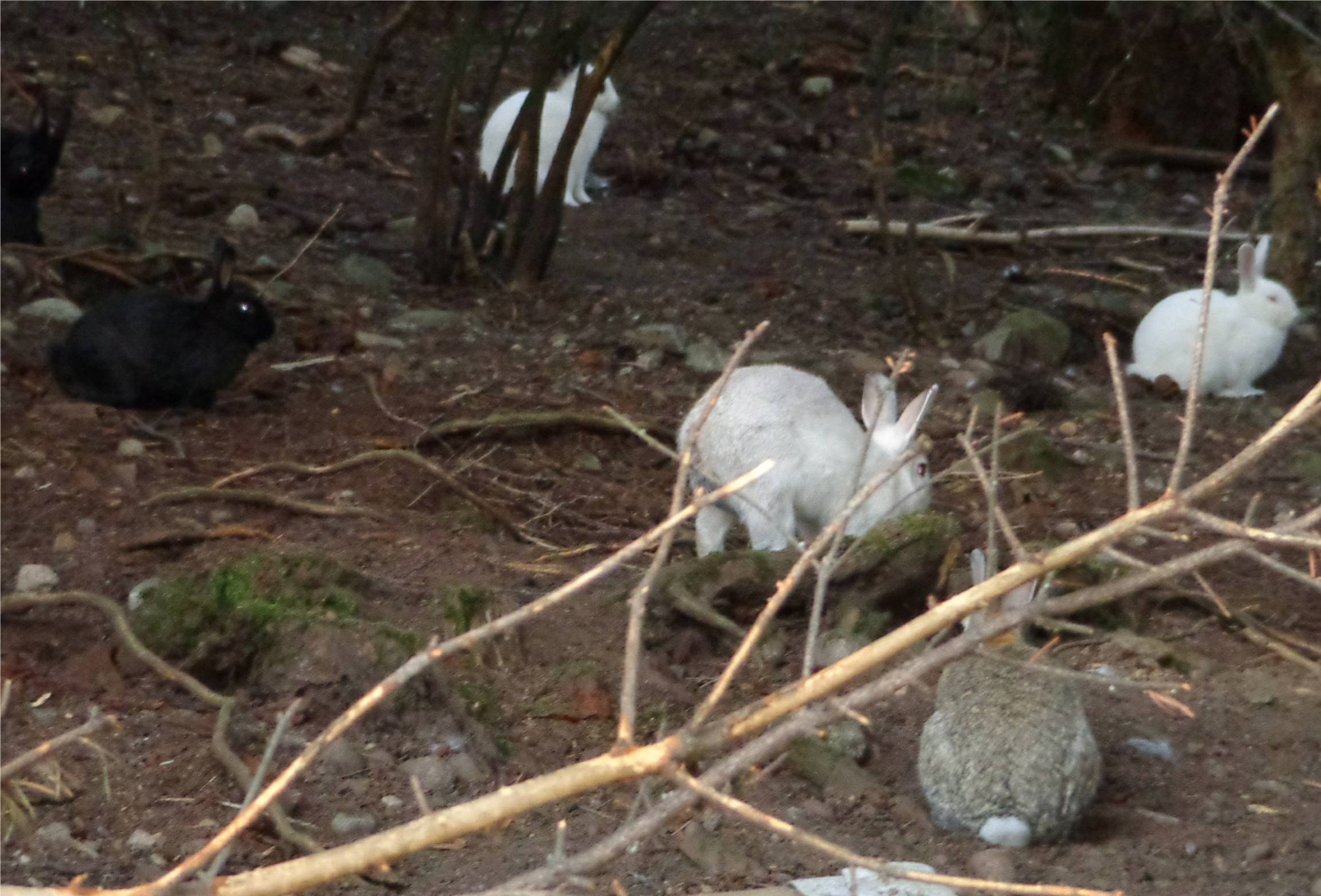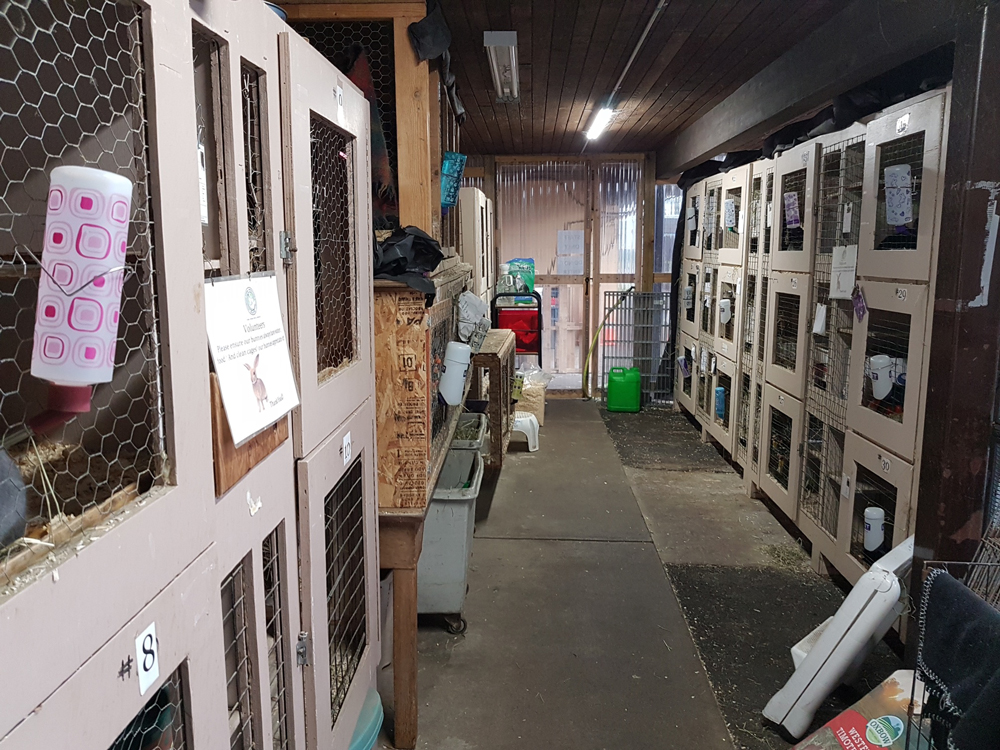Pasteurella and other illnesses
Rabbit Diseases/Infections
Pasteurellosis: The bacterium, Pasteurella multocida, is the major infectious agent of rabbits. It is most often transmitted among chronically infected does and their litters or between breeding males and females. The bacteria most often reside in the nose, lungs and eye membranes, but can spread to other areas of the body. Pasteurellosis of rabbits may take many different forms. Respiratory disease, including pneumonia and infection of the nasal passages and sinuses, is very common. Infections of the eye membranes, middle ear, jawbone and uterus are most often the result of the Pasteurella organism. Abscesses are also common and occur when the Pasteurella organism settles in a specific location. The rabbit's body responds to this invasion with an influx of tremendous numbers of white blood cells to fight the infection. Pus results from the accumulation of dead and dying white blood cells and tissue cells in the area of the infection. Pasteurella infections may become incurable if untreated or improperly treated. Aggressive antibiotic therapy with the appropriate drugs, however, especially if undertaken early in the course of the disease, is often rewarding. Many antibiotics have great difficulty penetrating the relatively inaccessible sites of most infections and the thick pus seen in rabbit abscesses. Pasteurellosis is a persistent problem in most rabbitries and very difficult to eradicate. This disease creates its most serious problems under conditions of malnutrition, overcrowding, poor sanitation, temperature extremes, inadequate air circulation and other stressful situations. Ideally, prospective owners should obtain their pet rabbit from a Pasteurella- free rabbitry, but this is not always possible. Regardless of origin, all newly acquired pet rabbits should be thoroughly examined by a veterinarian as soon as possible after purchase. https://www.lbah.com/word/rabbit/pasteurella-rabbit/
Poisonous Plants
If you’re feeding wild plants or your rabbit has access to a garden, make sure you can reliably identify the plants. They don’t know what’s good or bad for them. Poisonous plants vary between animals. Don't assume that since a bird, squirrel or pig ate a plant with no problems, others (human or rabbit) can do the same. If you think your rabbit is ill, seek medical attention immediately.
 A
good source of
information is the
Textbook of Rabbit Medicine written by Frances
Harcourt-Brown, a veterinary surgeon and acknowledged expert in rabbit health
matters.
A
good source of
information is the
Textbook of Rabbit Medicine written by Frances
Harcourt-Brown, a veterinary surgeon and acknowledged expert in rabbit health
matters.
December 2016 A virulent case of pasteurella recently struck a colony of European rabbits in south Nanaimo, many of which are on private property. The homeowner became alarmed when three died suddenly. A total of ten passed away in a matter of weeks. Necropsies performed on several of the rabbits found the bacteria spread and grew so fast it was in every organ and went septic.
Mid-Vancouver Island rabbit owners warned about deadly virus
March 2, 2018 BC Government News & other media
Rabbit owners in the Nanaimo area are asked to take precautions after numerous dead feral rabbits were found on the campus of Vancouver Island University, and in the Rotary Bowl area.
Three rabbits sent to the Animal Health Centre in Abbotsford were determined to have died of rabbit haemorrhagic disease, caused by a calicivirus. It is suspected that others have died as a result of the disease as well. The Ministry of Forests, Lands, Natural Resource Operations and Rural Development added that more rabbits will be tested in the coming days.
Additional electron-microscope testing is underway. The disease is an immediately notifiable disease in Canada, and the Canadian Food Inspection Agency has been informed.
Rabbit haemorrhagic disease is an extremely infectious and lethal disease of rabbits. It is the third confirmed diagnosis of this virus in Canada, and the first in British Columbia. The disease is exclusive to rabbits. Other animals, including dogs and cats, cannot be infected.
 While there is no threat to humans,
the public is advised not to release domestic rabbits into the wild at any time.
As well, rabbit owners should take precautions when disposing of any rabbit
remains, and contact their veterinarian for more information. Rabbit calicivirus
is a pathogen, which affects only European rabbits, not native rabbits.
While there is no threat to humans,
the public is advised not to release domestic rabbits into the wild at any time.
As well, rabbit owners should take precautions when disposing of any rabbit
remains, and contact their veterinarian for more information. Rabbit calicivirus
is a pathogen, which affects only European rabbits, not native rabbits.
Vancouver Island University, Nanaimo Animal Control Services and the BC SPCA are also looking into the matter. Leon Davis, Nanaimo BC SPCA branch manager, recommends not picking up any dead rabbits and instead, people should call animal control services. In light of the situation, Nanaimo SPCA will not accept rabbits for the time being. In 2017, animal control services recovered 174 dead rabbits most of which were hit by cars.
NOTE: Overall, more than 30 feral rabbits have been found dead at VIU, a dozen at Rotary Bowl and roughly 200 at a nearby rescue. The disease is so contagious that it can spread through the air and has no known cure, according to experts.
March 5, 2018 Officials say they’re not sure of source of rabbit killing virus in Nanaimo
Comment: We have spoken to the refuge owner, and the number of deceased rabbits has climbed to 250. Day after day there are dying rabbits and bodies that have to be picked up and buried. It’s something nobody should have to deal with.
While officials have not determined the source of the ‘rabbit killing virus’ in Nanaimo, plenty of theories abound. The outbreak originated at the University of Nanaimo, so could it be foul play and somebody with the education deliberately released the virus?
Over the years, government agencies and others have expressed using lethal control to eliminate populations, citing the European rabbit as an’ invasive species and a pest.’ A University of Victoria Director of Campus Planning falsely claimed they’re ‘dangerous’ vectors for disease. So much for intelligence and compassion.
March 6, 2018 update: The number of deaths of feral rabbits on VIU campus has now climbed to 60, up from 30. There is no vaccine in BC to protect European (domestic) rabbits from this fast-spreading and deadly virus. Ian Welch, director of veterinarian services and research support at UBC says “the virus has a short incubation period of one to two days and can run through an entire population of rabbits in as little as 13 days.” It can also easily spread on surfaces like shoes and car tires. A vaccine exists, but Welch said it takes weeks to kick in, so it wouldn't help with an initial outbreak. Mar 9/18 The strain has been confirmed as RHD-2.
NB: The RHD virus is passed in large amounts in the droppings of infected rabbits and can also be spread by contact with rabbit products, rodents, and contaminated objects. It is very hardy, easily withstanding heat and cold. The use of RHD as a biological control agent has been used in Australia and New Zealand in efforts to reduce populations of European rabbits. Not only is this dangerous, it is inhumane, unethical, and largely ineffective.
March 16-18, 2018: Nanaimo (Coastal) Animal Control has now picked up close to 300 dead rabbits and the rabbit refuge has lost all its 275 rabbits. This is just devastating and there are growing concerns the virus is moving into other communities. It appears to have now spread to the Comox Valley, and experts say it’s only a matter of time before it hits Greater Victoria. Dr. Kwan says “the virus has been technically eradicated from Canada and the United States for over 30 years” so this is very tragic.
The effects of the virus, while fatal for the rabbits, has also disrupted an entire ecosystem. If predators, like hawks, have ingested infected rabbits they can spread live RHD-2, while other apex predators, like cougars, have lost a food source. This impacts us all – and it’s all due to irresponsible human action!
Operational Plan: Rabbit Hemorrhagic Disease 2018
This plan is for all BC SPCA Sheltering Branches and is based on information from CFIA, the Ministry of Ag, and the Ministry of FLNOR.
All plan information is place until further notice (will likely be at least a few months). Plan subject to change (generally would become more restrictive) as new information available. Shelter Plan
| Zone | Shelter Intake/ Quarantine | Adoption/Transfer | Biosecurity | Events, Notes |
| 1 (Island) | No rabbit intake unless emergency (CID case originating in that community). Emergency intakes: 14 day quarantine, strict PPE. | Rabbit adoptions ok after 14 day quarantine. Includes existing rabbits in care- must monitor for 14 days from when entered shelter before adoption. Do not bring foster rabbits back to branch. | Full PPE (gown, double gloves, shoe/boot covers, caps) for all quarantine rabbit handling. | No rabbit events. |
| No rabbit transfers. | Full PPE for all body collection. | |||
| No transfer vehicles on property in Nanaimo. Vehicle wheel wash for any vehicles leaving property for other communities. | Warning sign in all shelters. | |||
| 2 (Lower Mainland, Fraser Valley) | Rabbit intake ok but try to minimize numbers in shelter. | Rabbit adoptions ok after 14-day quarantine. Includes existing rabbits in care- must monitor for 14 days from when entered shelter before adoption. Do not bring foster rabbits back to branch. | Full PPE (gown, double gloves, shoe/boot covers, caps) for all quarantine rabbit handling. | No rabbit events. |
| 14 day quarantine, strict PPE | No rabbit transfers. | Full PPE for all body collection. | ||
| Warning sign in all shelters. | ||||
| 3 (North, Interior) | Rabbit intake ok, no restrictions, no quarantine. | Rabbit adoptions and transfers ok within region. | Full PPE for all body collection. | No rabbit events. |
| Warning sign in all shelters. |
There will be an economic impact on rabbit breeders who raise for show, pets, meat, and breeding purposes.
On March 19, 2018 the Washington State Department of Agriculture posted: Washington rabbit owners - be aware of deadly rabbit virus reported in BC. With fairs, shows and exhibitions coming up soon, there is always the concern that someone could bring an infected rabbit from an area where the disease has been reported. Remember that a certificate of veterinary inspection must accompany all animals entering Washington State, including rabbits.
March 21, 2018 update: Deceased rabbits are still being found throughout the Nanaimo region on a daily basis. Suspected cases of the virus in Comox and Courtenay have yet to be confirmed. (since been confirmed)
A number of dead rabbits first showed up in mid-to-late February around Vancouver Island University and quickly spread to the nearby Rotary Bowl area. At the same time there were suspected cases in several small colonies on Annacis Island in Delta. Rabbits disappeared from one day to the next.
Delta shelter manager, Ryan Voutilainen, explained that four were picked up and held for a period of time, and when news of the Vancouver Island situation circulated, they were sent to the Animal Health Centre for testing. One of the rabbits tested positive for the disease. All had severe lesions on most internal organs.
The animal shelter is working with different agencies, like the Ministry of Agriculture, and had to be sure of the results before notifying the public. Since the four reported cases in mid-February there have been none since. Let’s hope this was an isolated incident.
March 28, 2018 update: The RHD-2 virus has been confirmed in the Comox Valley. Stacey Thomas, with the College of Veterinarians of B.C. says because of the outbreak, the federal gov’t has granted an emergency import permit for bringing the vaccine from France into Canada. The SPCA is moving forward with the process to order vaccines for its shelter rabbits on Vancouver Island and the Lower Mainland (about 150 doses)
The mortality rate in and around
Nanaimo has slowed, but is still bad. Within the City, about 450 rabbits have
now been picked up by animal control. It includes those found on the SPCA
property but NOT the 275 lost by the sanctuary. One veterinarian estimates the
number of rabbit deaths around Nanaimo to be roughly 1,000.
April 11, 2018 update: Nearly two weeks ago two young deceased feral rabbits were found outside Richmond’s animal shelter on No. 5 Rd. They were diagnosed with the highly contagious rabbit hemorrhagic disease (RHDV-2) and now all 66 of the facility’s adoptable rabbits will be killed. It’s heart-rending.
The building is very old and the adoptables were housed in close quarters, so while quarantine and biosecurity precautions were attempted, and the rabbits monitored, it was too late. Heindrich Snyman, veterinary pathologist with the Ministry of Agriculture recommended “to depopulate, both from a contamination perspective and for humane reasons.” Questions remain, however, as to whether earlier proactive measures may have averted this tragic outcome.
All contents will be removed and treated as biohazard material and appropriately transported and disposed of.
NB: The rabbits were kept in three separate areas outside the building so in all probability a visiting infected feral rabbit introduced the deadly virus.
April 16, 2018 Vaccine for rabbit haemorrhagic disease available from B.C. vets
October 25, 2018 According to the BC Ministry of Agriculture, the last positive case of RHD-2 was detected in early May.
Since that time, the ministry’s Animal Health Centre has tested 23 rabbits and all have been negative for the disease. No vaccinated animals have contracted the disease, and ministry staff have been hearing that healthy feral European Rabbits have been returning to affected areas.
April 10, 2019 update Rabbit owners in the mid-Island area are being advised to take precautions with their pet rabbits after the death of four feral rabbits in Parksville from a highly infectious virus. The source of the virus is unknown.
Due to ongoing quarantine requirements and because rabbits tend to stay in care for a long time awaiting adoption, space for incoming rabbits will continue to be limited. Please contact your local branch before you go if you are looking to bring a rabbit into a BC SPCA shelter.
The BC SPCA continues to adopt out vaccinated rabbits who have completed their quarantine. We have many wonderful rabbits ready for adoption who can be viewed online.
June 21, 2019 According to a news release by the BC Ministry of Agriculture, rabbit haemorrhagic disease (RHD) has been confirmed as the cause of death of several pet rabbits living in a downtown Vancouver apartment building If pet owners notice any signs of illness in their rabbits, they should contact their veterinarian.
The Vancouver SPCA is still accepting and adopting out rabbits, in part because the city animal shelter is not able to accept unvaccinated rabbits. They do not have a quarantine area, as opposed to the Vancouver SPCA. The public vaccination clinic at the SPCA Hospital has been sold out.
April 14, 2020 Southwest US faces lethal rabbit disease outbreak - First time in nation rabbit hemorrhagic disease virus type 2 confirmed in wild species. This is very sad news indeed and it’s spreading.
Rabbit Hemorrhagic Disease Virus (RHDV) https://rabbit.org/rhdv/
May 5, 2020 Rabbit haemorrhagic disease, USA, from the world Organisation of Animal Health (OIE) https://www.oie.int/wahis_2/public/wahid.php/Reviewreport/Review?reportid=34197&fbclid=IwAR1iPTTnuRuX1Nv9SnF-QCQkDghGHp5JBlCVMcIq_Oh_CVExxshZ3A4KsDk
British Rabbit Council: RHD-2 Facts Sheet
Domestic Rabbit Abandonment PDF 3
More information on rabbits:
Rabbit Facts, misinformation on rabbit vaccines corrected by Gooch; 2018 RHD Nanaimo
Poor quality of life for most rabbits
Dogs enjoy a privileged status; the lowly rabbit
Protect your rabbit from the weather: Heat Kills
Related news: Parksville council mulls rabbit cull - comment, letter